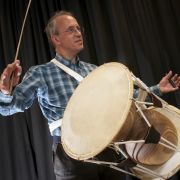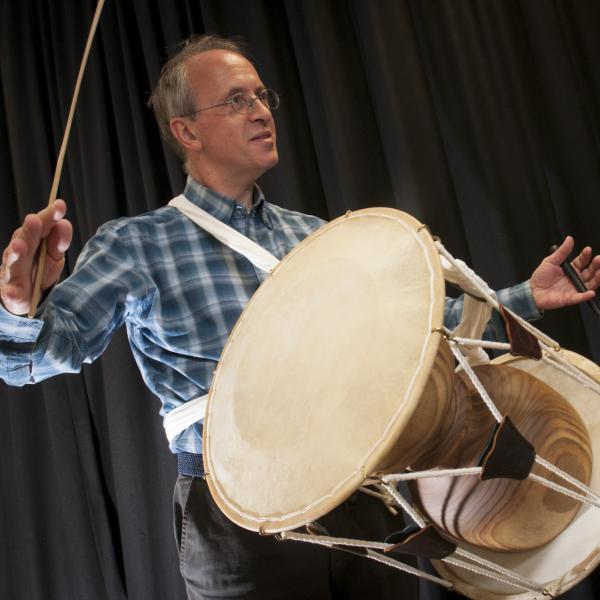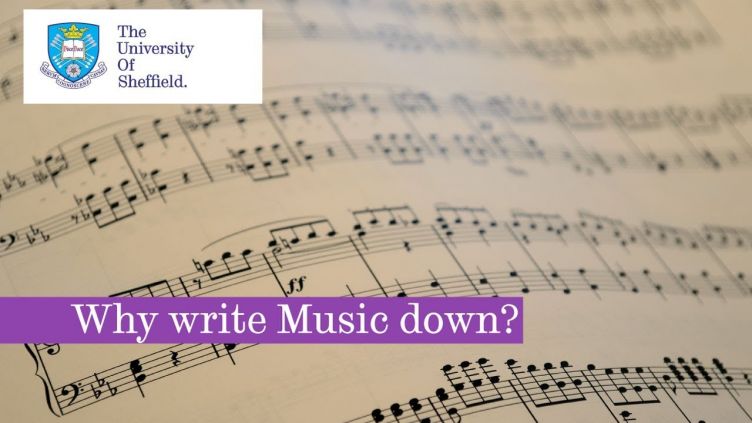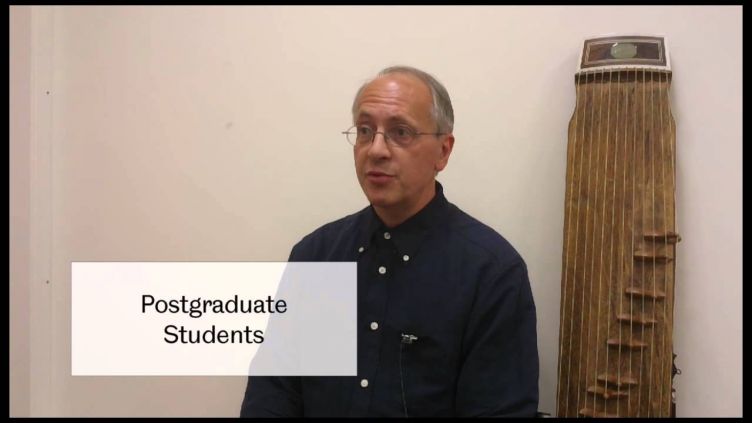Dr Andrew Killick
Department of Music
Reader of Ethnomusicology
Director, MA in Traditional and World Music (distance learning)


Full contact details
Department of Music
1.12
Jessop Building
Leavygreave Road
91ų▒▓ź
S3 7RD
- Profile
-
IŌĆÖm currently Reader in Ethnomusicology and teach on our distance learning MA programme in Traditional and World Music. I teach in all areas of ethnomusicology and world music and also in popular music studies. My research has been primarily on the music and musical theatre of Korea and more recently on world music transcription and analysis more generally.
IŌĆÖve supervised PhDs on topics ranging from the traditional, popular and (Western-style) classical musics of East Asia to Nigerian popular music, the adaptation of traditional Cretan music to the classical flute and the flat-second scale degree in various traditions worldwide. I like to take a holistic view of music, valuing all forms of music and all approaches to the study of music for what they can teach us about human musicality.
I came to 91ų▒▓ź in 2003 after working my way east around the world. My BMus at Edinburgh was followed by a winter in India studying dhrupad singing, then an MA at the University of Hawaii and a PhD at the University of Washington, both with periods of fieldwork in Korea. I taught at Illinois State and then Florida State before completing the circle back to my native Yorkshire. When not engaging with music, I enjoy walking and running in the Peak District.
- Qualifications
-
- PhD in music (ethnomusicology), University of Washington, 1998.
- MA in music (ethnomusicology), University of Hawaii, 1990.
- BMus in music, University of Edinburgh, 1984.
- Research interests
-
I have published on traditional and contemporary musics of Korea, musical theatre of various cultures, world music transcription and analysis, ethnomusicological theory and method and the teaching of world and popular musics.
My main focus at present is ŌĆ£global notationŌĆØ (globalnotation.org.uk), a new form of music notation that I have developed with the aim of being able to represent any kind of music in terms of its own principles while being as easy to learn as possible. I am currently working on refining and extending the system to cover a wider range of musical situations and purposes and making it easier to produce and play back.
For the longer term, I am using global notation for the examples in a book with the provisional title The Making of the Musical World. Most existing overviews of ŌĆ£world musicŌĆØ portray the world as a set of separate cultures developing different forms of music to suit their different needs, but that is, at most, only half the story, and IŌĆÖm trying to tell something of the other half by tracing how musical ideas tend to be generated and disseminated through contact between different cultures.My view is that the intrinsically interconnected nature of the worldŌĆÖs musical idioms will be best revealed through a common and culturally unspecific notation system, global notation.
Books
2015 Hwang Byeonggi yongu: Hanguk cheontong eumak-ui jipyeong-eul neolpida. (Korean translation by Kim Hee Sun of my 2013 book Hwang Byungki: Traditional Music and the Contemporary Composer in the Republic of Korea.) Seoul: Pulbit.
2013 Hwang Byungki: Traditional Music and the Contemporary Composer in the Republic of Korea. Aldershot: Ashgate.
2010 In Search of Korean Traditional Opera: Discourses of ChŌĆÖangguk. Honolulu: University of Hawaii Press.
2005 Southerners, Northerners. Translation (with Cho Sukyeon) of novel Namnyok saram pungnyok saram by Lee Ho-Chul. Norwalk, Connecticut: EastBridge.
Edited books
2002 Garland Encyclopedia of World Music, Vol. 7: East Asia. New York: Garland. (Associate editor and author of 16 articles.)
Journal articles
2021 Holzapfel, Andre, Emmanouil Benetos, Andrew Killick, and Richard Widdess. ŌĆ£Humanities and Engineering Perspectives on Music
Transcription.ŌĆØ Digital Scholarship in the Humanities.2020 ŌĆ£Global Notation as a Tool for Cross-Cultural and Comparative Music Analysis.ŌĆØ Analytical Approaches to World Music 8(2): 235-279. With responses by eight senior scholars in world music analysis.
2017 ŌĆ£Traditional Music and the Work-Concept: The Kayag┼Łm Sanjo of Hwang Byungki.ŌĆØ Yearbook for Traditional Music 49: 1-25.
2014 ŌĆ£Should World Music Teachers Teach World Music? Popular Music and the World Music Survey Course.ŌĆØ Journal of World Popular Music 1(1): 156-182.
2007 ŌĆ£Hwang Byungki and North-South Musical Exchange.ŌĆØ Papers of the British Association for Korean Studies 11: 49-56.
2006 ŌĆ£Holicipation: Prolegomenon to an Ethnography of Solitary Music-Making.ŌĆØ Ethnomusicology Forum 15(2): 273-299.
2005 ŌĆ£ChŌĆÖangguk: A Hybrid-Popular Musical Theatre of Korea.ŌĆØ CHIME Journal 16-17: 204-215.
2003 ŌĆ£Road Test for a New Model: Korean Musical Narrative and Theater in Comparative Context.ŌĆØ Ethnomusicology 47(2): 180-204.
2003 ŌĆ£Jockeying for Tradition: The Checkered History of Korean ChŌĆÖangguk Opera.ŌĆØ Asian Theatre Journal 20(1): 43-70.
2002 ŌĆ£Korean ChŌĆÖangguk Opera: Its Origins and its Origin Myth.ŌĆØ Asian Music 33(2): 43-82.
2001 ŌĆ£National Music and National Drama: The Musical Eclecticism of ChŌĆÖangguk.ŌĆØ Tongyang Umak 23: 179-191.
2001 ŌĆ£ChŌĆÖangguk Opera and the Category of the ŌĆśTraditionesqueŌĆÖ.ŌĆØ Korean Studies 25(1): 51-71.
1998 ŌĆ£ChŌĆÖangguk: Re-making PŌĆÖansori as ŌĆśKorean Traditional OperaŌĆÖ.ŌĆØ Korean Culture 19(2-3): 4-13.
1998 ŌĆ£The Choson Songak YonŌĆÖguhoe and the Advent of Mature ChŌĆÖangguk Opera.ŌĆØ Review of Korean Studies 1: 76-100.
1997 ŌĆ£Putting PŌĆÖansori on the Stage: A Re-study in Honor of Marshall R. Pihl.ŌĆØ Korea Journal 37(1): 108-130.
1992 ŌĆ£Musical Composition in Twentieth-century Korea.ŌĆØ Korean Studies 16:43-60.
1991 ŌĆ£Nationalism and Internationalism in New Music for Korean Instruments.ŌĆØ Korea Journal 31(3): 104-116.
Chapters
2021 ŌĆ£Composing at the Intersection of East and West: Beyond Nationalism and Exoticism?ŌĆØ In Tong-Soon Lee, ed., The Routledge Handbook on Asian Music: Cultural Intersections. New York: Routledge. Pp. 47ŌĆō71.
2016 ŌĆ£Music in Korean Traditional Theatre.ŌĆØ In Siyuan Liu, ed., Routledge Handbook of Asian Theatre. New York: Routledge. Pp. 146ŌĆō149.
2014 ŌĆ£Visual Evidence in Ethnomusicology.ŌĆØ In The Routledge Companion to Music and Visual Culture. Ed. Tim Shephard and Anne Leonard. New York: Routledge. Pp. 75-84.
2014 ŌĆ£Avant-garde Music for Traditional Instruments: Extended Techniques in the Music of Hwang Byungki.ŌĆØ In Contemporary Music in East Asia. Ed. Hee Sook Oh. Seoul: Seoul National University Press. Pp. 31-63.
2013 ŌĆ£Tradition and Innovation in Changgeuk Opera.ŌĆØ In Rediscovering Traditional Korean Performing Arts. Ed. Haekyung Um and Hyunjoo Lee. Seoul: Korea Arts Management Service. Pp. 64-71.
2012 ŌĆ£Backstage Musical.ŌĆØ In Continuum Encyclopedia of Popular Music of the World, Vol. 8: Genres: North America. Ed. John Shepherd, David Horn, and Dave Laing. London: Continuum. Pp. 27-9.
2012 ŌĆ£Broadway Musical.ŌĆØ In Continuum Encyclopedia of Popular Music of the World, Vol. 8: Genres: North America. Ed. John Shepherd, David Horn, and Dave Laing. London: Continuum. Pp. 95-112.
2011 ŌĆ£An Ethnomusicology of Individual Success: Hwang Byungki and ŌĆśNational MusicŌĆÖ in the Republic of Korea.ŌĆØ In Ethnomusicological
Encounters with Music and Musicians: Essays in Honor of Robert Garfias. Ed. Timothy Rice. Aldershot: Ashgate. Pp. 31-48.2008 ŌĆ£Individuality, Nationality, and Universality in the Music of Hwang Byungki.ŌĆØ In Essays on Music Offered to Dr. Lee Hye-ku in Honor of His Hundredth Birthday. Ed. Hwang Junyon. Seoul: Minsokwon. Pp. 747-764.
2008 ŌĆ£Changgeuk.ŌĆØ In Pansori. Ed. National Center for Korean Traditional Performing Arts. Seoul: National Center for Korean Traditional
Performing Arts. Pp. 97-127.2007 ŌĆ£ChŌĆÖangguk,ŌĆØ ŌĆ£Music and Musical Instruments: Korea,ŌĆØ ŌĆ£PŌĆÖansori,ŌĆØ ŌĆ£Yosong kukkuk.ŌĆØ In Encyclopedia of Asian Theatre. Ed. Samuel Leiter. Westport, Connecticut: Greenwood Press. Vol. 1 pp. 95-96, 446-447; Vol. 2 pp. 495-496, 869.
2005 ŌĆ£Broadway.ŌĆØ In Continuum Encyclopedia of Popular Music of the World. Ed. John Shepherd, David Horn, and Dave Laing. London: Continuum. Vol. 4 pp. 286-290.
2002 ŌĆ£Wax Philosophical: Re-writing the History of Chinese Musical Influences in Korea.ŌĆØ In Korean Music. Ed. Young-Key Kim Renaud, R.
Richard Grinker, and Kirk W. Larsen. Washington, D.C.: Sigur Center for Asian Studies. Pp. 27-32.2001 ŌĆ£Music as Ethnic Marker in Film: The ŌĆśJewishŌĆÖ Case.ŌĆØ In Soundtrack Available: Essays on Film and Pop Music. Ed. Arthur Knight and Pamela Robertson Wojcik. Durham, NC: Duke University Press. Pp. 185-201.
2001 ŌĆ£The Traditional Opera of the Future? ChŌĆÖanggukŌĆÖs First Century.ŌĆØ In Contemporary Directions: Korean Folk Music Engaging the Twentieth Century and Beyond. Ed. Nathan Hesselink. Berkeley: Center for Korean Studies, University of California. Pp. 22-53.
1997 ŌĆ£Cracking a Rock with an Egg: Problems and Solutions for KoreaŌĆÖs ŌĆśTraditional OperaŌĆÖ ChŌĆÖangguk.ŌĆØ In Onji nonchŌĆÖong samjip (Onji Institute Research Papers, Vol. 3: A Festschrift for Cho Nam-kwon). Ed. Cho Kyoik. Seoul: Onji Hakhoe. Pp. 279-309.
1995 ŌĆ£The Penetrating Intellect: On Being White, Straight, and Male in Korea.ŌĆØ In Taboo: Sex, Identity, and Erotic Subjectivity in Anthropological Fieldwork. Ed. Don Kulick and Margaret Willson. London: Routledge. Pp. 76-106.
Reviews
2021 Keith Howard, Songs for ŌĆśGreat LeadersŌĆÖ: Ideology and Creativity in North Korean Music and Dance. Music and Letters 102(1): 163 166.
2016 Ian Russell and Catherine Ingram, eds., Taking Part in Music: Case Studies in Ethnomusicology. Folk Music Journal 11(1): 77ŌĆō79.
2014 Haekyung Um, Korean Musical Drama: PŌĆÖansori and the Making of Tradition in Modernity. Music and Letters 95(4): 694-6.
2014 July 24, 1896: Korean First Recording and Hyelim Kim: Taegum Collection: Nim. Yearbook for Traditional Music 46: 241-3.
2013 Nathan Hesselink, SamulNori: Contemporary Korean Drumming and the Rebirth of Itinerant Performance Culture. Ethnomusicology 57(2): 354-7.
2011 Keith Howard, Chaesuk Lee and Nicholas Casswell, Korean Kayagum Sanjo: A Traditional Instrumental Genre. Ethnomusicology Forum 20(2): 280-83.
2008 Simon Mills, Healing Rhythms: The World of South KoreaŌĆÖs East Coast Hereditary Shamans. Psychology of Music 36(4): 499-501.
2006 Adelaida Reyes, Music in America: Experiencing Music, Expressing Culture. British Journal of Music Education 23(1): 117-119.
2005 ŌĆ£Review Essay: Some Recent Books on the Musical.ŌĆØ Popular Music
24(3): 445-452.
2004 Chan E. Park, Voices from the Straw Mat: Toward an Ethnography of Korean Story Singing. Asian Theatre Journal 21(2): 206-208.
Websites
2018 Global Notation (website). globalnotation.org.uk
- Research group
-
IŌĆÖve supervised research on a wide range of topics in ethnomusicology and popular music studies, including doctorates by Dissertation and by Performance Studies. Many of these projects have been related to my own primary area of research, traditional music of East Asia, while others might focus on any part of the world with my input being mainly methodological. I am particularly interested in supervising research that applies analytical approaches to world and popular music.
Current PhD projects
- John Ball: Transmission of Indian Classical Music in the UK
- Xiao Gao: Musical Culture of the Chinese Diaspora Community in Indonesia
- Xinyi Liang: Piano Transcriptions of Chinese Traditional Music from the Cultural Revolution Period
- Kate Walker: Taiko and the UK
Completed PhDs
- Adewale Adedeji: Yoruba Culture and its Influence on the Development of Modern Popular Music in Nigeria
- Chingyi Chen: Claiming Musical Hybridity: Guoyue and Guoyue Tuan in Contemporary Taiwan
- Julia Chieng Chin Yee: Sound Properties, Festival Experience and Soundscape Perception of the Rainforest World Music Festival in Sarawak Cultural Village, MalaysiaFay Hield: English Folk Singing and the Construction of Community
- Li-Hua Ho: Buddhist Music and Dance in Contemporary Taiwan
- Sheng-Wei Hsu: Interpreting the Piano Music of Taiwanese Composer Kuo Chih-Yuan
- Chiung-Hui Hwang: The Multilayered Monophony and Sliding Tones of Qin Music: Perception, Structure and Aesthetic Interpretation
- Efi Ioannidou: Greek Cypriot Wedding Music and Customs: Revival and Identity
- Shu Jiang: Yaogun Is Not Rock 'n' Roll: Place, People and Performance in Chinese Yaogun (1997-2008)
- Celia Ya-Chen Lee: Chen QigangŌĆÖs Voices, 1995-2008: Cross-cultural Aesthetic, Ethnicity, Translated Modernity, Gender and Politics
- Sarha Moore: The Other Leading Note: A Comparative Study of the Flat Second Pitch Degree in North Indian Classical, Ottoman or Arabian Influenced, Western, Heavy Metal and Film Musics
- Ruth H. Mueller: Female Participation in South Korean Traditional Music: Late Chosŏn to the Present Day
- Lon├Īn ├ō Briain: Hmong Music in Northern Vietnam: Identities, Traditions and Modernities
- Lijuan Qian: Pop Song Composition in China in the 1980s: An Elite Synthesis for the Mainstream
- George Zacharioudakis: Interpreting Early Cretan Dance Music with Cretan Instruments and with the Western Flute: A Musical Revival
- Yue Zhao: The Musicality of C-Pop: A Study of Chinese Popular Music from 1985-2010
- Professional activities and memberships
-
- 91ų▒▓ź Korea Day: performance contest adjudicator (2018, 2019)
- Local Arrangements Chair, Annual Conference of the British Forum for Ethnomusicology (2017)
- Co-editor, Ethnomusicology Forum (2007-2010)
- Secretary, British Forum for Ethnomusicology (2004-2007)
- Council Member, Society for Ethnomusicology (2000-2003)
- President, Association for Korean Music Research (2000-2002)
Links


